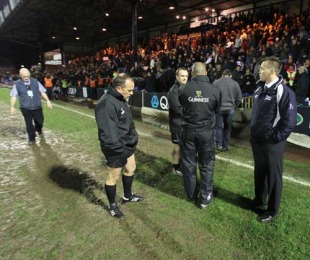|
Guinness Premiership
Referee blamed for Wasps postponement
Scrum.com
December 10, 2009

Someone should have read the rulebook, according to the Premier Rugby panel
© Getty Images
Enlarge
A Premier Rugby panel have laid the blame at the feet of the referee in their explanation for letting Wasps go without punishment for not playing their Guinness Premiership match against Sale Sharks. Sale officials will respond on Thursday to the panel's decision that Wasps "did not actually refuse" to play the match two weeks ago, because the referee did not actually insist it should go ahead. In a highly technical written judgment, the panel claimed referee David Rose did not realise the final call on whether the game should go ahead despite a soggy pitch was his. Rose thought Wasps' complaints over the ground meant the match could not proceed, so his failure to "state sufficiently clearly" to Wasps that they must play or forfeit absolved them of any wrongdoing. But the panel agreed Wasps would have been in breach of regulations if they had refused to play the match following "clearer" communication to them. The game was postponed 10 minutes before its scheduled kick-off time, with some 8,000 spectators inside Edgeley Park. Members of Wasps' coaching team had approached Rose 45 minutes earlier, expressing concern about the amount of water and mud on the pitch, with particular reference to scrummaging safety. The panel said: "We are clear in our view of what went wrong in this case. In short, the referee was acting under the impression that the relevant rule to be applied was IRB Law 1.6 'Objections to the Ground', which states as follows: 'If either team has objections about the ground or the way it is marked out, they must tell the referee before the match starts; the referee will attempt to resolve the issue, but must not start a match if any part of the ground is considered dangerous.' "That impression was mistaken, since the relevant regulation applying to the fixture was actually (Guinness Premiership) regulation 4.4(j). "The referee was further under the impression that the relevant decision as to what was 'considered dangerous' within the meaning of IRB Law 1.6(b) was, or at least could be, the unilateral decision of the objecting club. "In other words, the referee thought that, if one club considered any part of the ground to be dangerous, then he, the referee, 'must not start the match'. In our judgment, that impression was also mistaken. "The relevant consideration as to what is or is not dangerous must be one for the referee. It cannot sensibly be a unilateral decision for the objecting club. That would be a recipe for chaos and abuse. "Against the background of this dual misapprehension, we can understand why the referee did not ever formally, or clearly, state to Wasps that he had made a decision that the pitch was fit for play and that the fixture should proceed that night. "The result of this unfortunate confusion was that Wasps were entitled to proceed on the basis they had expressed their safety concerns (repeatedly), and that the referee had taken those concerns into account when making his own decision to postpone or call off the fixture. "In this regard, it is relevant that Wasps knew at all times that they had not actually refused to play the fixture. The panel shifted at least some of the blame towards the two clubs involved, claiming they should have consulted the rules if there was any uncertainty, while the RFU was also in their sights. "We find that, even though the referee was acting under this dual misapprehension, he is by no means solely responsible for confusion on the night of the fixture. "A copy of the relevant regulations could, and should, have been available and could, and should, have been consulted by all parties. The referee could have been given clearer guidance about the relevant regulations and their application by officials from the RFU (Rugby Football Union). "The referee could have been given more explicit training and guidance in advance of the fixture. We hope that obvious lessons will now be learned from this incident and that no similar incident will be allowed to recur." © Scrum.com
|
Live Sports
Communication error please reload the page.
-
Football
-
Cricket
-
Rugby
-
- Days
- Hrs
- Mins
- Secs
F1 - Abu Dhabi GP
Abu Dhabi Grand Prix December 11-131. Max Verstappen ()
2. Valtteri Bottas (Mercedes)
3. Lewis Hamilton (Mercedes)
4. Alexander Albon ()
5. Lando Norris ()
6. Carlos Sainz Jr ()
-
ESPNOtherLive >>
Darts - Premier League
Golf - Houston Open
Snooker - China Open
Tennis - Miami Open

